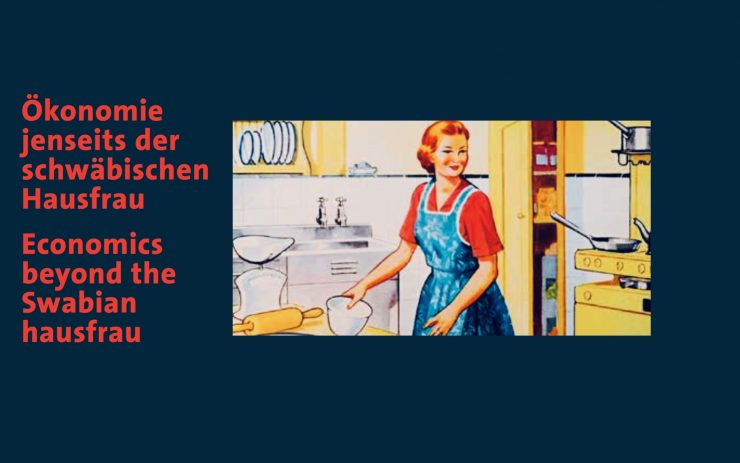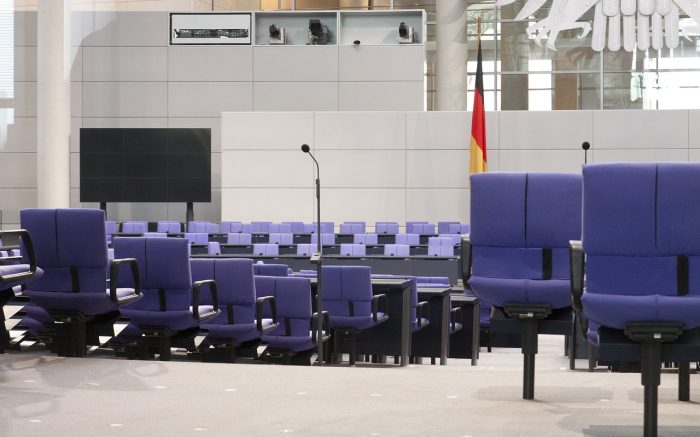»Ökonomie jenseits der schwäbischen Hausfrau«: Die Veranstaltungsreihe

»Wir brauchen eine Kampagne zur ökonomischen Alphabetisierung, damit die Menschen die Sprache verstehen, welche die herrschende Klasse verwendet«, so hat es Ha-Joon Chang, Ökonom an der Universität Cambridge, einmal formuliert – und wir wollen Euch noch einmal auf eine Veranstaltungsreihe in diesem Sinne aufmerksam machen: Unter der Überschrift »Ökonomie jenseits der schwäbischen Hausfrau« nehmen renommierte internationale WissenschaftlerInnen in Berlin die vorherrschenden volkswirtschaftlichen Debatten kritisch in den Blick: Geht ein Staat notwendigerweise Pleite, wenn er mehr ausgibt als einnimmt? Wurde die Krise von 2007/08 wirklich durch riskantes Verhalten der Banken verursacht? Warum ist der Reichtum derart ungleich verteilt?
Die Veranstaltungsreihe ist von der Hellen Panke e.V. in Kooperation mit Brave New Europe, Rosa-Luxemburg-Stiftung und dem Netzwerk für Plurale Ökonomik organisiert worden. Der erste Termin dieser Reihe mit Steve Keen brachte ein volles Haus im Salon der Rosa-Luxemburg-Stiftung. In wenigen Tagen wird Frances Coppola über die »Stürme des Finanzwesens« sprechen, Anfang April kommt Branko Milanovic, um Fragen der globalen Ungleichheit zu diskutieren. Die Veranstaltungen werden auf Englisch geführt und deutsch simultan übersetzt. Darüber hinaus gibt es Veranstaltungen mit Pavlos Roufos, Andrea Capussela und Quinn Slobodian nur auf Englisch.
14. März
Years of Stone: the Greek Crisis and the Eurozone
Pavlos Roufos
2010 marked the beginning of the Greek crisis, introducing devastating austerity measures that radically transformed all aspects of life. Eight years later, the management of the crisis has proven to be a complete failure, an outcome that was repeatedly predicted by its critics and recently admitted by some of its designers. In this presentation of his recently-published book, »A Happy Future is a Thing of the Past: The Greek Crisis and other Disasters« (Reaktion Books, 2018), Pavlos Roufos discusses the underlying aims of the crisis management programme as well as the social movements that arose to oppose it. Pavlos Roufos has been active in social movements in Greece since the early 1990s. His book on the Greek crisis was published in 2018 by Reaktion Books (London) in collaboration with Brooklyn Rail (New York). He is currently doing a PhD on German economic policy at the University of Kassel.
14. März in der Hellen Panke, Kopenhagener Straße 9, 10437 Berlin (Nähe S+U Bahn Schönhauser Allee), 19 Uhr, Entry 2 €. The event will be held in English only.
20. März
The Political Economy of Italy’s Decline
Andrea Capussela
Italy is a rich society served by an advanced manufacturing sector, where the rule of law is weak, however, and political accountability low. The country has long been in a downward spiral, from which a politico-economic equilibrium has emerged that is as consistent as it is inefficient, and hinders economic and democratic development. The Political Economy of Italy’s Decline seeks to identify the causes of Italy’s downward trajectory, and to explain how the country could shift to a fairer and more efficient equilibrium. Andrea Lorenzo Capussela has a PhD on competition policy. He led the economics office of Kosovo’s international supervisor, and wrote State-Building in Kosovo: Democracy, Corruption, and the EU in the Balkans (I.B. Tauris, 2015). He did some voluntary work on the development of a district in Calabria, and wrote the Italian version of The Political Economy of Italy’s decline (LUISS University Press, March 2019).
20. März in der Hellen Panke, Kopenhagener Straße 9, 10437 Berlin (Nähe S+U Bahn Schönhauser Allee), 19 Uhr, Entry 2 €. The event will be held in English only.
1. April 2019
Wie entwickelt sich die Ungleichheit in Europa und im Rest der Welt?
Branko Milanovic
Die Finanz- und Eurokrise ist vorerst vorüber. In Europa und anderen Industrieländern hat sich die Wirtschaft kräftig erholt, in den Schwellenländern setzt sich der Aufschwung fort. Die Früchte dieses Aufschwungs verteilen sich allerdings sehr unterschiedlich. In dem Vortrag soll die Entwicklung der Ungleichheit untersucht werden: Aufstieg der Mittelschicht in Asien, Stagnation der Mittelschicht in reichen Regionen wie Europa. Branko Milanovic hat in Belgrad Ökonomie studiert und war 20 Jahre leitender Ökonom in der Forschungsabteilung der Weltbank. Als führender Wissenschaftler für Entwicklung und Ungleichheit ist er derzeit Gastprofessor an der Universität New York.
1. April 2019 im Monarch Bar, Skalitzer Str. 134, 10999 Berlin (U Bahn Kottbusser Tor), 19 Uhr, Eintritt 2 €. Die Veranstaltung ist auf Englisch mit deutscher Simultanübersetzung
13. Juni
Neoliberal Globalism and the Backlash from Within
Quinn Slobodian
Protecting global capitalism from democracy was a major project of the 20th century. Today, many of the institutions designed to insulate the world economy are under assault. Paradoxically, many of the backlash’s roots can be found within neoliberal thought itself. Slobodian will discuss how we got here and what possible futures lie ahead. Quinn Slobodian is the author of »Globalists: The End of Empire and the Birth of Neoliberalism« (Harvard, 2018). He teaches history at Wellesley College.
13. Juni in der Hellen Panke, Kopenhagener Straße 9, 10437 Berlin (Nähe S+U Bahn Schönhauser Allee), 19 Uhr, Entry 2 €. The event will be held in English only.
Guter Journalismus ist nicht umsonst…
Die Inhalte auf oxiblog.de sind grundsätzlich kostenlos. Aber auch wir brauchen finanzielle Ressourcen, um oxiblog.de mit journalistischen Inhalten zu füllen. Unterstützen Sie OXI und machen Sie unabhängigen, linken Wirtschaftsjournalismus möglich.
Zahlungsmethode











